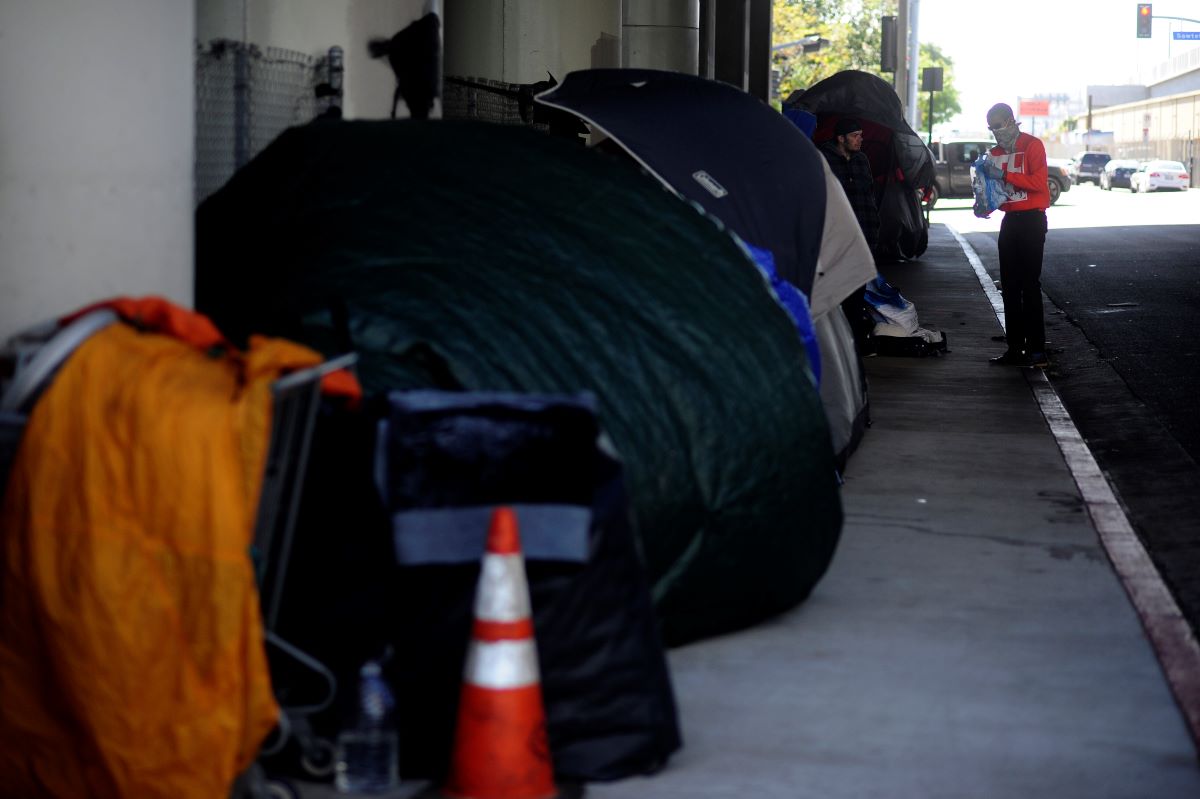Some Cities Are Focused on Meaningful Interventions While Others Provide a Less Dignified Escape from Homelessness
Several cities are critically looking at their homeless intervention services as experts expect homelessness to explode across the country once the eviction moratorium officially ends.
According to estimates by the Aspen Institute, between 30 and 40 million people are at risk of experiencing homelessness once the moratorium expires. In a study of local eviction policies, the organization said areas showing the lowest increase in homelessness often had robust intervention services.
Examples of intervention services include community-based rapid re-housing programs, project-based transitional housing, subsidy-only programs such as stimulus payments or guaranteed income, and usual care like treatments and services.
Down south in Texas, Austin’s city council created a new program known as “Southbridge” that will provide bridge shelter services to people experiencing homelessness who are displaced from encampments.
The program will run out of a Protective Lodging facility (ProLodge), a hotel on the outskirts of town. It is part of the city’s Housing-Focused Encampment Assistance Link (HEAL) initiative. The hotel is intended to open at the end of May.
Austin’s approach stands against the recent passage of Proposition B, a local urban camping ban. The agency also has 45 city-owned plots of land that could house temporary safe outdoor spaces to house sanctioned encampments.
Similarly, local leaders in Anaheim, California, replaced three police officers with homeless outreach workers in Orange County. The six-month pilot program is a first in county history and is funded through federal COVID-19 relief funds.
Known as the Community Care Response Team (CCRT), the group aims to prevent COVID-19 from spreading among people experiencing homelessness by directly providing medical and social services to people living on the streets. It is also responsible for guiding people who come in contact with CCRT members into some form of housing.
The existing police outreach team has helped over 400 people find housing since 2013. In comparison, the newly formed CCRT team helped 254 people in their first three months.
Outside the United States, some governments are making sizeable investments in national homeless intervention strategies.
For example, the government of Canada will provide approximately $6 million over three years to support projects that test and develop innovative approaches to addressing homelessness. Each program must target over-represented communities, develop strategic community partnerships, and develop new techniques to measure the scope of homelessness nationwide.
“Every Canadian deserves a safe and affordable place to call home,” said Ahmed Hussen, the Minister of Families, Children and Social Development. “Our government is committed to eliminating chronic homelessness in Canada and knows that this investment, through Reaching Home, will help identify innovative approaches and solutions to support communities across the country.”
While many other cities are taking similar approaches to solve homelessness, others are moving in the opposite direction. Instead of focusing on creating meaningful interventions, these cities prioritize programs that do not provide a dignified means of escaping homelessness.
Out west, Las Vegas Stronger aims to eradicate homelessness through alternative policing and crisis intervention. The group focuses its work on providing substance abuse and mental or behavioral health treatment. They say on their website that these two services address the “major issues” that impact people experiencing homelessness.
The organization already has the support of the Las Vegas City Council and Metropolitan Police Department. The group also contracted with the county to provide housing and limited-capacity crisis stabilization services. It has partnered with insurance companies such as Anthem and United Healthcare to provide healthcare at its clinics.
The nonprofit says their ideal intervention ends with transporting a person experiencing homelessness to a treatment center or shelter. At the same time, the group asks city residents to do two things:
- First, it asks people not to provide food or money to people experiencing homelessness. According to Next City, this gives people “continued reasons not to accept and use the services available.”
- Second, it asks residents not to call the police on people experiencing homelessness. Instead, the group says residents should call them, and they will send a crisis intervention team to transport the individual to a partner shelter or detox clinic.
Boulder, Colorado’s city council approved $3 million in funds to create a special police force designed to break up homeless encampments. The removal team also includes urban park rangers and “downtown ambassadors,” representatives paid for by the local business community.
The program is in response to an escalating number of public complaints about homeless encampments. In 2021, the city has received over 300 complaints so far. At the same time, city officials have identified at least 21 encampments and over 120 unsheltered individuals living in the area.
During the meeting, Councilmember Adam Swetlik said officials could have better spent the money on housing solutions rather than continued displacement.
“We’re spending $1.5 million on additional cops,” Swetlik said. “That’s 25,000 nights of hotel stays.”













